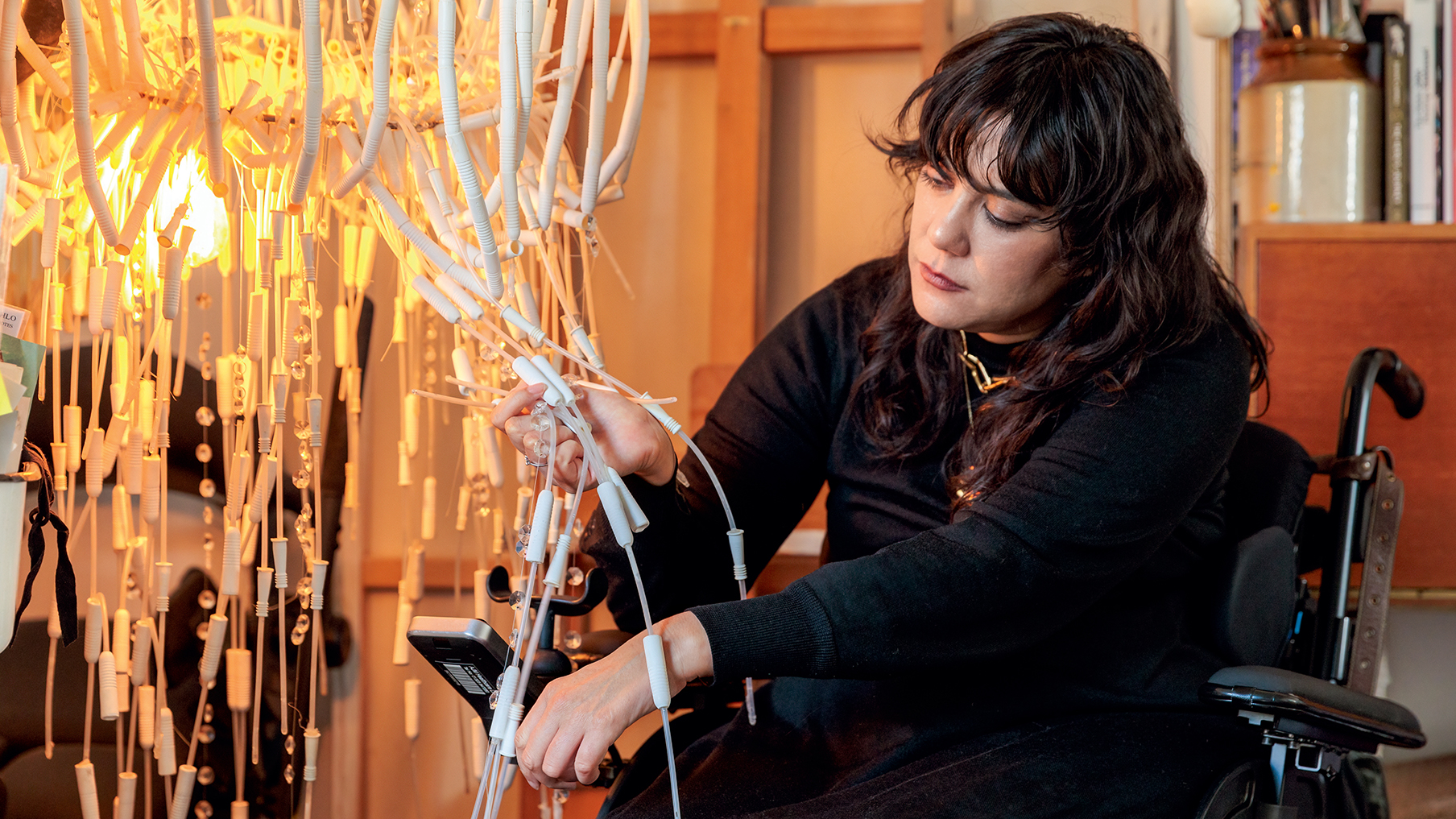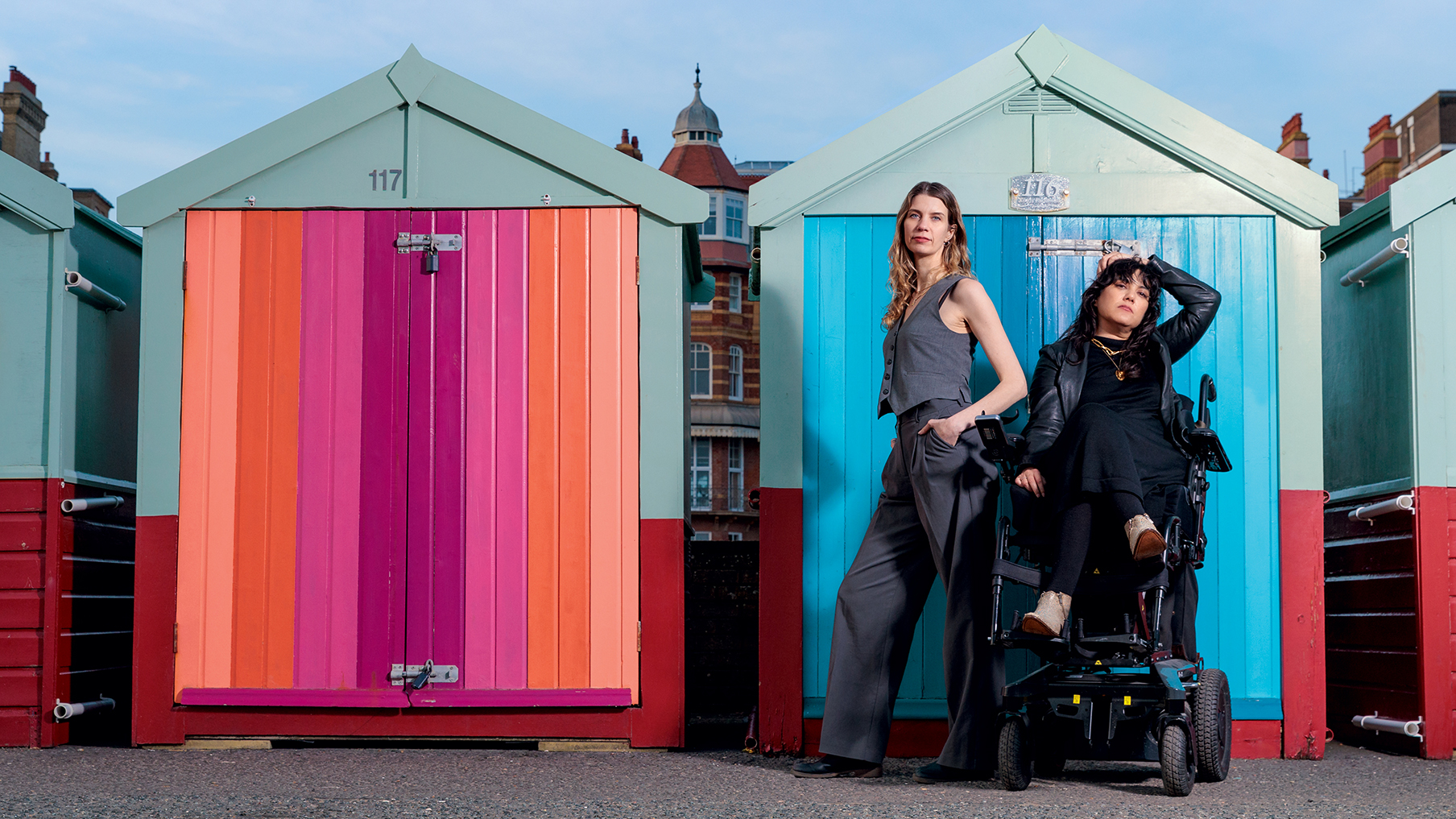We Might Regret This might just be the most important show about disability we’ve seen on TV so far. Mainly because it’s not actually a show about disability. It’s a comedy exploring the messiness of life, which just happens to feature a wheelchair user (Freya) and her personal assistant (PA)/best friend (Jo).
Yes, it’s rooted in real-life experiences, but real-life best friends and co-writers Kyla Harris (who plays Freya) and Lee Getty are very definite about what they wanted to do with this witty, original, look at inappropriate relationships and blurred boundaries.
Something special
“We always knew that we were experiencing something kind of unparalleled and unique in being friends and working together as PA and PA user. We wondered, was there a way to express the vulnerability in the situations that we go through. And so that’s how it started,” says Lee (Lee’s part in the show is played by actress Elena Saurel).
“Although, for a long time we didn’t share our art. Kyla was a visual artist and I was a writer, but I never let her read a script. And she would kind of keep her stuff away from me. Maybe we feared we would somehow disagree or feel criticised. Then one day she edited a submission of mine and her feedback was so fantastic. We realised maybe we should work together on something.”
“After watching a show called Transparent, we talked about how disability is similar,” says Kyla, who moved from Canada, to the UK, in 2010, and now lives in Brighton, where our cover shoot took place.
“When someone transitions it affects everyone around them. We felt there should be a show about disability that was like that. Lee said we should be the ones to write it. I laughed, but here we are, six years later.”
“One thing we really wanted to highlight was the different ways that disability has a ripple effect, bringing positives and challenges,” adds Lee. “It was a way to show the nuance of the different lives and the transformations that it causes in everyone around as well.”
It helped that Lee worked in the industry, insofar as knowing how to write pitches and structure a script, and the two had creative backgrounds. But in the end their big break actually came through one of Kyla’s PAs. Getting the script into the hands of big-hitting comedy producer Ash Atalla (whose credentials include The Office and The IT Crowd) was the luck/fate/timing they needed to see their hard work and talent pay off.
Learning boundaries
Kyla says writing the show helped her to process her past. “I think I initially asked friends to become PAs because I felt like I was going to be somehow less of a burden. Those decisions were probably from internalised ableism, but I also wanted it to feel fun – if I’m spending 24 hours with someone, I want to be able to make bad decisions and I want to feel enabled to make bad decisions. Over time I have had to learn boundaries.”
“In those early days it gave Kyla and me freedom,” says Lee. “I would need money and she would need a PA. We would be alone and that would allow us to do wild things. We created this little bubble that we could function within. But it became clear that I’m not a great PA. Mainly because when you’re a friend, you have opinions. You want the freedom to say things like, ‘I don’t know if that’s the healthiest choice for you right now.’ But the whole point of a PA is to have full autonomy over your life, and to make the choices you want to make. Whether they’re a potential mistake, or not, is not any of a PA’s business. We learned as we matured that it wasn’t the best dynamic for us. Now, I’m happy to help my friend pee, or do things that she might require at any moment without any kind of pay.”
While inspiration came from these real-life experiences, none of the scenes have actually happened to the pair. “We appreciate series and films that dig really deep and explore things that are scary or embarrassing to show to others. So we tried really hard to do that. We’d write something as extreme and as honest as we could. And then, later, we’d remember that Kyla has to actually act in it,” says Lee.
“The penny often didn’t drop until I was on set in my underwear!” laughs Kyla. “There was a kind of strange ability to separate ourselves. Even in the very first public screening of the pilot, we were sitting next to each other like, ‘Do you remember how it starts?’ It was weird. I mean, we’ve been working on it. We’ve been in the editing room. We know it through and through, yet, somehow, we forget that it’s us.”

Humour has value
Speaking of such things, We Might Regret This addresses aspects of disability that aren’t widely shown on primetime TV – mainly authentic sex and relationships. Telling a different kind of story was important to both women, and while it didn’t have to be a comedy, humour has value. “Comedy is such a good entry point for people to engage with difficult material or material that they haven’t come across before,” says Kyla.
“It helps,” agrees Lee, “but I don’t think it’s necessary to talk about difficult things in a funny way. Our goal was to strike a balance where we could go deeper into things, but also to say there are things that are OK to laugh about as well. We’ve used humour to get through some of the most challenging times together and so it was authentic to us.”
“Plus, as an audience member I’m really bored by the idea of tragedy and inspiration when disabled people are represented,” says Kyla, “I think that nuanced portrayals resonate with people – as they should, because those tropes of tragedy and inspiration are so tired and frankly two-dimensional.
“So many people still think that disability means a wheelchair user, and, obviously, there’s every shade of disability in between. This is a disabled character who is flawed, part of a family situation, in a relationship, and around people who are just as messed up as she is. As it’s about a disabled person, it’s important that it’s written by a disabled person to give it that honesty.
“We tried to make all the characters relatable. There’s no person who’s in the right, they’re all in this grey zone, no person is virtuous or unvirtuous. They’re all people with different sets of needs, trying to meet those needs in healthy and unhealthy ways. It’s a show about messy relationships and blurred boundaries and how we try to make it work as humans together, via collaboration and interdependence.”

More seasons on the horizon
While coy when asked about the success of the show, which has been commissioned for two more seasons, both happily acknowledge it’s struck a chord with the disabled community. “The number of messages, emails and DMs that we’ve received from disabled viewers saying they felt seen and pointing out all these little details. Details that you only know if you know. It’s been incredible,” says Kyla.
“And there have been a lot of people who have seen the last scene in episode three [Freya’s first independent outing in her powerchair, pictured right] and said that it was really emotional for them. They felt like that’s the journey that they went through to get their mobility device. I think that sense of freedom when it finally happens really resonated with a lot of people.
“And the non-disabled people that we worked with have learned so much through just being on set or being around us, and getting comfortable with disability in ways that they weren’t before. Hopefully, it’s had a bit of an impact.”
The behind-the-scenes effects are just as valuable to Kyla and Lee as what appears on screen. “For a long time, Kyla thought that she couldn’t work in film and television because it’s too extreme,” explains Lee.
“The hours are too hard. It kind of asks for this Superman figure that doesn’t need to eat, sleep, or care for anyone or anything like that. We wanted to change it from the inside too.
“We had such an amazing team. People would come up to us and say things like, ‘I’ve been doing this for 15 years, and this is the warmest, friendliest, most enjoyable set to be on.’ The film and television industries, in a way, are the most set up and prepared to be flexible to disability and to the needs of other people, because that’s what they do. They make things happen against all odds, all the time. We hope that the show can set a bit of a standard.
“All of our sets were wheelchair accessible, we had plenty of people with different disabilities on set. And we want to get better at it as well. We want to drive that change in the industry, too. That’s really important to us.”
We Might Regret This aired on BBC Two and is available on BBC iPlayer.
Kyla is a Motability Scheme customer
I’ve been a part of the Motability Scheme now for nine years and it’s totally transformed my life, and the way that I’m able to access things. There’s great customer service and I think it’s the most easy to navigate business in the UK. I have a Citroën Berlingo and I’m a passenger in the back. I’d love a more affordable option where I could be seated up front, but overall, it’s a fantastic Scheme. I’d never had a Wheelchair Accessible Vehicle (WAV) before. Getting in and out with such ease is a total game changer.
With thanks to: the team at Sussex Film Office





